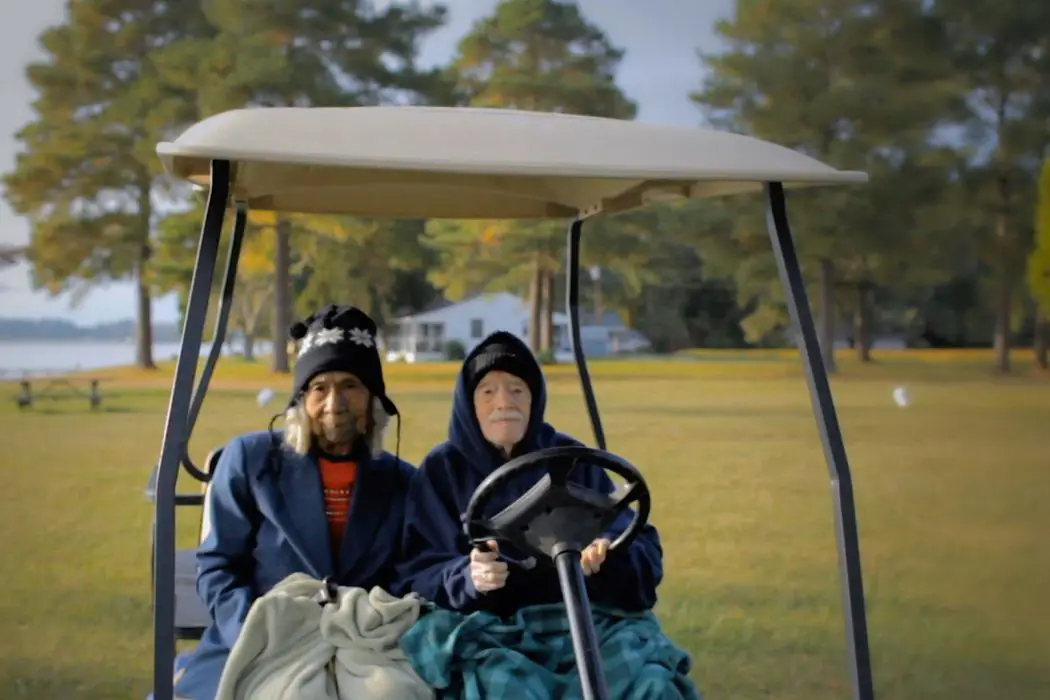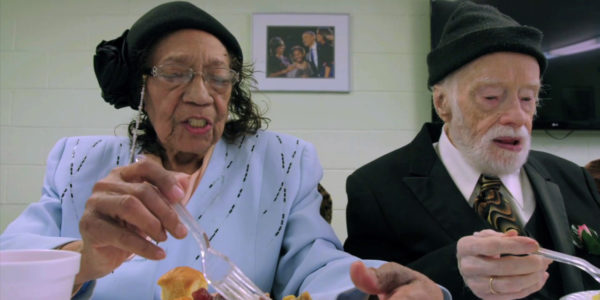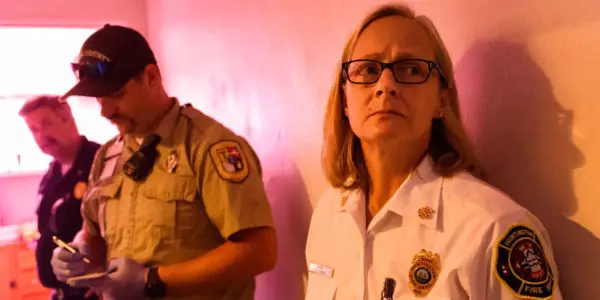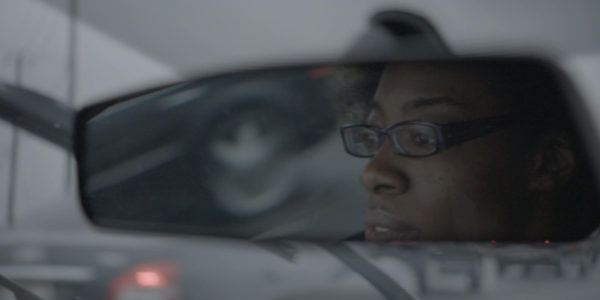Strong While Standard: 2018’s Oscar Nominated Documentary Shorts

Arlin is an all-around film person in Oakland, CA. He…
It’s almost time for Oscar, Oscar, Oscar. As the world asks “fish penis or jizz peach?” for three hours, many will likely be overlooking some of the most interesting films being recognized by the Academy this year. As in years, past, the subject matter is anything but lighthearted. With topic ranging from elder abuse and heroin addiction to mental illness and police brutality, the nominees are not for the faint of heart.
Though the documentary branch continues to insist on recognizing only a certain kind of documentary short, I can easily say that this is the strongest program I have reviewed in my three years covering this category. This is a short overview of 2018’s Oscar nominated documentary shorts.
Edith+Eddie

The best film about a nonagenarian interracial couple you’ve ever seen. Throughout the stirring half hour that comprises Edith+Eddie, director Laura Checkoway offers a glimpse into both true contentment and the ugliest injustice.
The eponymous couple met in their 80s after sharing a winning lottery ticket. It was love at first sight, and since they have lived together in Edith’s home in Virginia. Eddie is the sort of seemingly impossibly old man who you might find in a bit part on Twin Peaks, but whose abundant wrinkled tattoos speak to a rich youth. Edith exudes warmth, and watching them attend church, put in their dentures, or do exercises on their couch together is the height of cuteness.
But the film gives us little time to revel in their relationship. We learn that Edith is under conservatorship by a lawyer she’s never even met but who’s paid by her estate, at the behest of one of her daughters, Patricia. Through this legal power Patricia seeks to bring her mother to live with her in Florida, but without Eddie. What ensues is a tragic portrait of a family disintegrating before our eyes. The tactics used by Patricia and her lawyer, Jessica, to achieve their goals are cold at best and repugnant at worst; it really seems like they’re attempting a legally sanctioned kidnapping.
Checkoway’s directly is bold in its subtlety. Shut out of the house and thus unable to shoot the film’s climactic moment, she plays the audio over a black screen, allowing the raw pathos of the moment to take center stage. In another moment, she cuts photographs of Edith and Eddie to the beat of Eddie’s respirator, showing that their relationship is literally his lifeline.
Edith+Eddie is powerful portrait of the letter of the law winning out over common sense and the prioritization of capital over people in the US.
Edith + Eddie is available on Youtube.
Heaven Is A Traffic Jam on the 405

Perhaps the most unexpected nominee is this quiet character study of artist Mindy Alper. Truly a one of a kind personality, Mindy shares with us the traumas of her past and the intimate details of her present through interviews and her artwork.
Living with a host of mental illnesses, for which she’s impressively medicated, Mindy is always creating; art for her is a refuge from the chaos and uncertainty of the world. Just as the title implies, Mindy relishes quiet, contemplative moments, and frequent conversations with her mother, while avoiding the mental oppression of physical spaces like Costco. To the latter point I can definitely relate.
Heaven is easily the most formally daring of the nominees, animating Mindy’s drawings and manipulating her home movies to reflect her memories and subjectivity, which is a welcome supplement to the films primarily interview-reliant format. Mindy is a tragic case of how trauma can be internalized; as a result of her childhood experiences, Mindy suffered profound isolation, loss of speech, and even loss of thoughts altogether. Her ascendancy as an artist is nothing if not inspiring.
Director Frank Stiefel deserves recognition for never ghettoizing Mindy or her work as “outsider” art, as others have and would. Many artists have experienced trauma akin to Mindy’s and her art can stand toe to toe with any in a gallery or museum space. One scene offers a striking parallel with the filmmaker, as Mindy expresses her anxiety about what her doctor will think of the giant bust she made in her likeness, feeling much like Steifel and any number of documentarians must about how their subjects will take their work.
Though it can be difficult to hear Mindy recount some her stories, Heaven is A Traffic Jam on the 405 is playful and beautiful treatise on the power of art as therapy and the uniquely human ability to transform pain into expression.
You can watch Heaven Is A Traffic Jam On the 405 now thanks to IndieWire.
Heroin(e)

If the title didn’t clue you in, the opening moments of Heroin(e) will tell you exactly what this film is about. Looking at the opioid epidemic from a hyperlocal perspective, the film follows three women in Huntington, West Virginia who are helping fight overdoses and addiction in different ways: Deputy Fire Chief Jan Rader, Drug Court Judge Patricia Keller, and Brown Bag Ministry member Necia Freeman.
It’s quickly evident that these women are more concerned with saving lives than doling out punishment, which is refreshing given the conversations happening at the federal level. Even more important is that the subjects of the film recognize the myriad societal factors that feed addiction, including the influence of pharmaceutical companies, rather than reducing the issue that one of individual character. The prescription to heroin pipeline and the introduction of super-potent Fentanyl has drastically increased the number of overdoses, Jan’s department responds to 5-7 daily.
Filmmaker Elaine McMillian Sheldon maintains a pretty direct approach, riding along with Rader and Freeman on their daily routines and sitting in on Judge Keller’s courtroom proceedings. Though the film is never able to fully balance the attention each of its subjects receives, it makes clear that all of them are able to pursue their goals only through empathy. That they are able to maintain that in the face of the same problems day in day out shows that they certainly earn the title the film bestows upon them.
In the heart of economically depressed coal country, addiction has increased inversely with hope. As you see through those who go through Judge Keller’s drug program, once hope is restored the effects on addiction are remarkable. Heroin(e) is a flashpoint in a national crisis with no end in sight, as another set of sirens preceed the closing credits.
Heroin(e) is available on Netflix
Knife Skills

Take the ethos of Ratatouille, that everyone can cook, and apply it to former inmates and you more or less have the plot of Knife Skills. Thomas Lennon‘s new film looks at Edwin’s in Cleveland, OH, a french restaurant with an innovative program that trains 80 recently released felons for six months in the setting of a high-class French restaurant.
Restauranter Brandon Chrostowski felt compelled to start the program because a judge once spared him a prison sentence, and what appears to be a rare display of the recognition of one’s own privilege, Brandon wants to offer these former convicts the second chance he got due in large part to the color of his skin.
Needless to say it is an easier transition for some than others, as trainees are dropped from the program throughout the film. It’s notoriously difficult for prisoners to get new jobs, as their offenses follow them from application to application. It was thus a little ironic to see Lennon do the same by including subjects’ offenses and the amount of time they served along with their names when they’re initially introduced. It’s likely that this film will be the most public exposure they ever have, so that this information should be inherently linked with their name appears a little dubious.
Knife Skills might attempt too much in too short a time, as many trainees are followed along with Brandon, and over the course of 6 months condensed to 40 minutes you don’t get to know the film’s subjects in the any great detail, though one trainee, Alan, definitely shines the brightest. It is a film with some great moments of personal insight, but its lack of focus left me slightly wanting.
You can watch Knife Skills via The New Yorker.
Traffic Stop

A horrifying first-hand account of the sort of incident that happens in this country every day, Traffic Stop looks at what happened when a black elementary school teacher was pulled over one sunny day in Austin, Texas. What should have been a routine traffic stop escalates with a quickness that hints at an insidious routineness, as offending officer Richter throws Breaion King to the ground while instinctively chanting the police mantra “stop resisting!” The officer’s entitlement and racism is on full display, reacting on a reptilian level to not receiving the respect he feels he deserves by writ of his uniform alone.
The film is built around dashcam footage from the Austin PD’s cars (it took three to handle the situation), supported by interviews with Breaion and footage of her participating in her usual threatening activity like teaching children math and attending dance class. But director Kate Davis mostly lets the drama of the primary source play out, depicting both the outrageous violence employed to subdue King and the on the spot revisionism at play by the officer to eschew responsibility for his behavior.
At one point he comments “she’s got some fight in her” as if King should have let herself be passively victimized while her humanity and liberty were simultaneously stripped from her. He then reveals that his actions are justified not by reality but by his own thoughts and impressions as he claims he “thought she would walk away”. Such rational is no doubt a substantial part of the issues America faces today.
Traffic Stop‘s strength, as with all great docs, lies in its capacity to instill empathy in the viewer, placing them in the middle of a situation they’d likely have little occasion to experience in their lives. In the film’s most telling sequence, King questions her arresting officer from the back seat of the squad car about why he feels that incidents like this are so prevalent. I won’t spoil what the answer is, but it’s as telling as it it’s depressing, evidence not just of institutionalized racism, but institutionalized absurdity.
Traffic Stop is an HBO Documentary Film and will be airing on HBO February 19th, with and an early preview on HBO NOW, HBO GO and HBO On Demand on February 16th.
A Plea For Diversifying Form and Tone
So Oscar, Oscar, oscar, who will win? That’s the point of this all, right? Of this group of shorts, Edith+Eddie can claim to be the most daring, well-made, and moving, as well the only nominee with the full endorsement of Cher. As such, I will be rooting for it to take home the decidedly un-fish like golden phallus this year. After parting ways with the voters on last year’s winner, I think we’ll be in sync again and Edith+Eddie should be the favorite to win.
After becoming accustomed to what the Academy considers award worthy documentary shorts, I can’t help but lament the lack of formal experimentation in these nominees, let alone any levity. Short docs, often made with a very limited crew on a shoe-string, or no, budget, are arguably the mode of filmmaking most free to experiment and play with its form. The feature documentary category may never be able to escape the prioritization of subject matter and circumstance over craft and storytelling (cough cough Jane was the biggest snub of the year cough). But shorts are unique in that they are literally defined by their non-conformity to the commercial restraints of film; notice how three out of five are available to watch free online while the other 2 occupy the ever evolving space of subscription streaming.
That the Academy continues to nominate short docs that stick to tried and true narrative presentational methods seems to be both an oversight and a fundamental misunderstanding of the power and potential of short form nonfiction.
Having been privileged to put together some documentary film festival programs over the same time that I’ve been reviewing Oscar nominees, I’ve come across so many films and filmmakers pushing the boundaries of presentation and expression, yet they rarely receive any recognition on film’s biggest night. I was as enthused as I was surprised to see Maximilien Van Aertryck and Axel Daielson‘s Ten Meter Tower among the 10 films shortlisted for this year’s awards. It’s a film whose simplicity belies its abundance of humanity, as it does nothing but gaze upon series of people at the top of a high dive, contemplating whether or not to jump. As you might imagine, the range of experiences and decisions vary widely, but by the end you feel as if you understand people better, even if you’re not told how or why.
Perhaps not surprisingly Ten Meter Tower failed to ultimately score a nomination. But hopefully its presence on the shortlist speaks to an increased willingness to consider short documentaries with a tendency toward experimentation and to acknowledge that best films may not necessarily be those that tackle the most pressing issues of the day. It’s notable among the roughly 2 1/2 hours of runtime between these films, the most affecting scene took place with with no visuals save for subtitles.
I love documentaries, and I want to be crystal clear that the five films are all excellent representatives of the form deserving on their nominations. I just fear that they are mostly the same type of representative, and hope that in future years the Documentary Branch will be more open to honoring films like Tower. And look, I get that a critic taking the Academy to task for the films they choose to recognize is as cliché as it is inconsequential, but in a year where it’s in the realm of possibility that Get Out or Phantom Thread could take home Hollywood’s biggest award, it seems to me not unreasonable to see a similar acknowledgment of formal daring in the vital and thriving form of the documentary short.
Woah, what, where am I? I think I just blacked out for a bit there…Oscar! Oscar Oscar, who will winnnnn?
2018 Oscar Nominated Short Documentaries are playing together in a limited theatrical run, which expands to more cities today. Check your local listing.
Does content like this matter to you?
Become a Member and support film journalism. Unlock access to all of Film Inquiry`s great articles. Join a community of like-minded readers who are passionate about cinema - get access to our private members Network, give back to independent filmmakers, and more.
Arlin is an all-around film person in Oakland, CA. He received his BA in Film Studies in 2010, is a documentary distributor and filmmaker, and runs Drunken Film Fest Oakland. He rarely dreams, but the most frequent ones are the ones where it's finals and he hasn't been to class all semester. He hopes one day that the world recognizes the many values of the siesta system.













